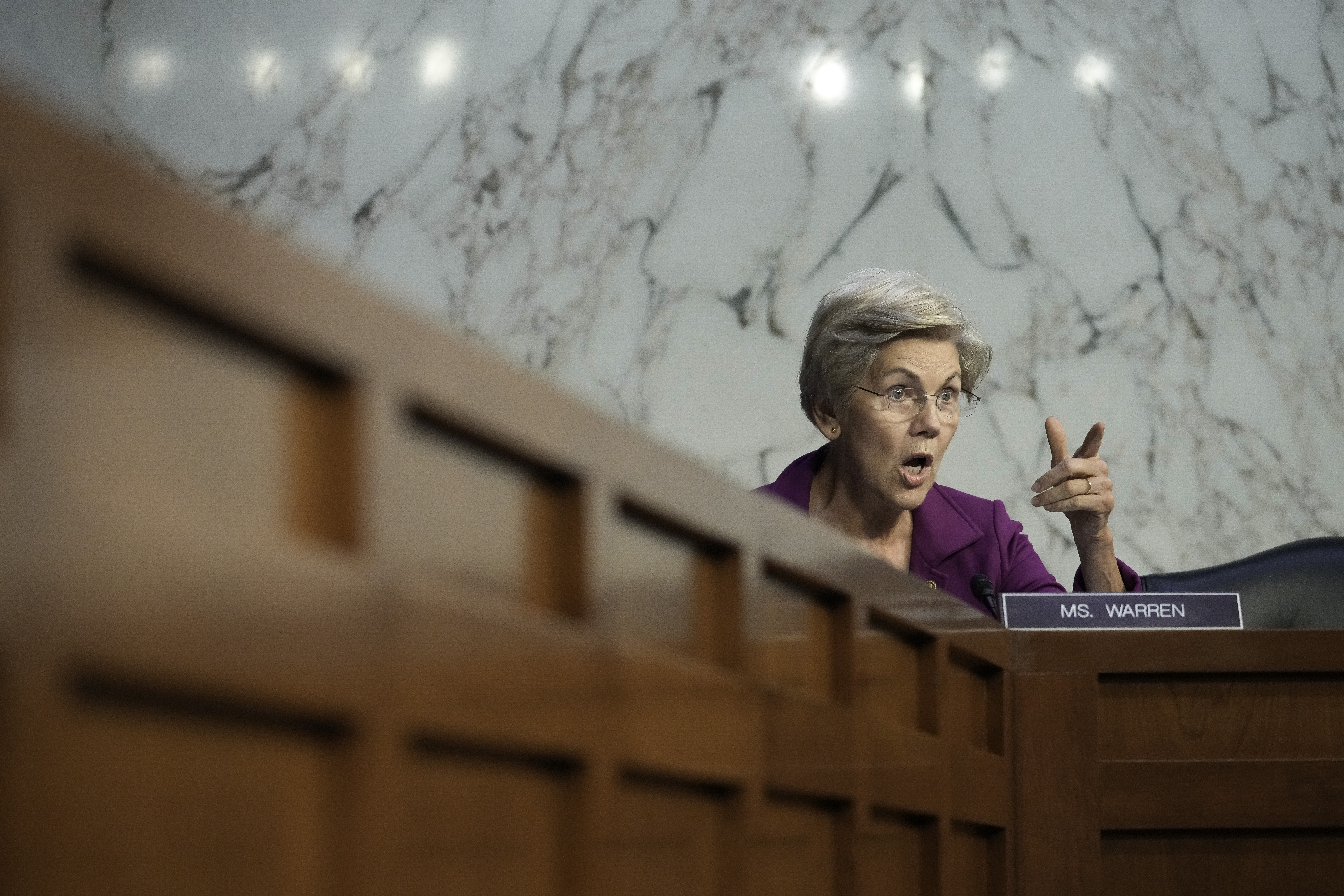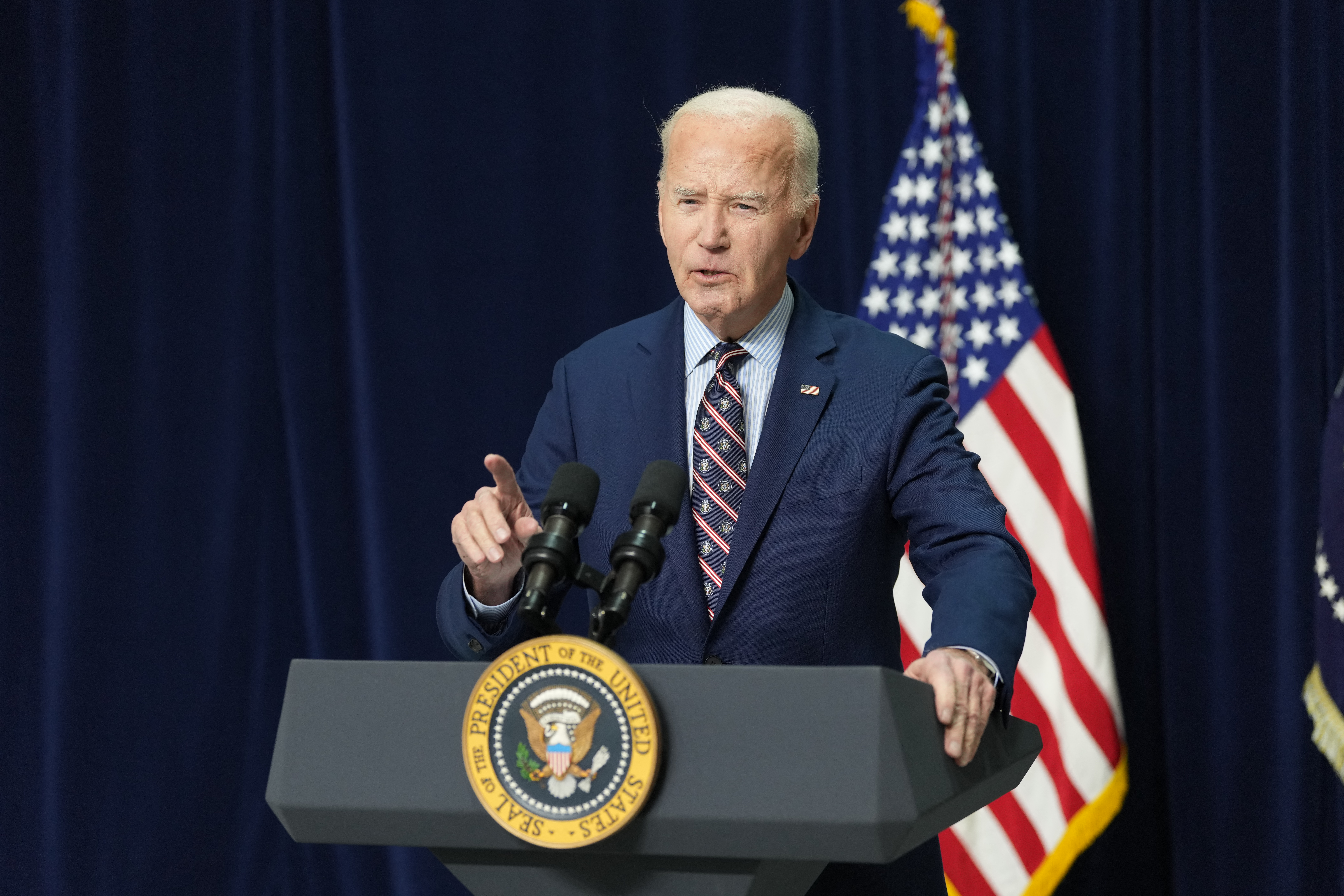Elizabeth Warren cultivates anti-crypto coalition
Warren is zeroing in on national security concerns as her focus for potential crypto legislation, even as she raises red flags about a host of issues in the space, from consumer protections to environmental impact.


Sen. Elizabeth Warren is branding herself as the scourge of crypto. And she's not doing it alone.
The progressive Massachusetts Democrat is starting to recruit conservative Senate Republicans to her anti-crypto cause and getting some early positive vibes from bank lobbyists, who also want to rein in digital asset startups.
Warren has emerged as a lead lawmaker on crypto oversight and is trying to build support behind a bill that would have sweeping implications for the industry via tougher anti-money laundering restrictions, including requirements that more crypto service providers verify customer identities.
“I want to emphasize how good her office has been to work with,” said Sen. Roger Marshall, the Kansas Republican who co-sponsored Warren’s legislation.
Crypto advocates are resisting Warren’s push, and some dismiss her as an outlier. But her budding partnership with GOP lawmakers reflects broader forces that are poised to unite progressives and conservatives, watchdog groups and bankers, who share common cause in wanting to derail the unfettered growth of crypto.
That's in stark contrast to last year, before the crypto market meltdown, when digital currency lobbyists had gained serious traction with lawmakers who drafted friendlier, bipartisan legislation with the industry’s input.
“It’s up to the crypto sector to prove at this point that they’re safe, secure and superior, and I don’t think they’ve made that case,” said Paul Merski, who leads congressional relations at the Independent Community Bankers of America.
The loosely aligned camps of crypto skeptics have been emboldened by last year’s collapse of the FTX exchange, which revealed extensive industry mismanagement and led to the arrest of former CEO Sam Bankman-Fried.
“What matters to me is [Bankman-Fried] spread money around Capitol Hill like it was dishwater, and nobody stopped at the time to ask any relevant questions about this company,” said Sen. John Kennedy, a Louisiana Republican who has joined Warren’s effort to investigate crypto-friendly bank Silvergate, which is under scrutiny for its ties to FTX.
Crypto advocates have tried to reject Warren’s anti-money laundering bill in the strongest possible terms, criticizing it as a broad, unconstitutional threat to privacy that could sweep in a range of software products beyond just finance-focused digital assets. Some former regulators are also taking issue with the bill.
The Treasury Department's Financial Crimes Enforcement Network has already been policing illicit finance in crypto for years. Centralized crypto exchanges that register as money transmitters are required to verify their customers' identities. Warren's bill would extend those kinds of responsibilities to other entities, including digital asset wallet providers and crypto miners.
“It’s so vague and broad-reaching that just understanding and implementing its ramifications could take years,” said Hogan Lovells partner Liz Boison, a former federal prosecutor who also worked at the Consumer Financial Protection Bureau when Warren was launching the agency.
Lobbyists are also trying to brush it off for similar reasons.
“We have multiple senators who would probably filibuster something like this,” Blockchain Association CEO Kristin Smith said.
But Warren’s attempt to stake out a clear position and a well of support on crypto regulation will be a factor that top lawmakers will have to contend with if they want to advance new legislation aimed at digital currencies.
"The crypto industry has an army of lobbyists and Washington insiders fighting against bipartisan rules to prevent crypto money laundering by criminals and rogue nations like Iran and North Korea," said Warren spokesperson Alex Sarabia. "There's no reason that crypto should be held to a lower standard and not comply with the same rules for the same activities to address the same risks."
Warren is zeroing in on national security concerns as her focus for potential crypto legislation, even as she raises red flags about a host of issues in the space, from consumer protections to environmental impact.
Warren said in an interview that regulators have tools to address consumer fraud but that “money laundering is in a different space.”
“The current legal structure essentially holds up a giant sign over crypto that says, money laundering done here,” she said.
It’s a concern that resonates across the aisle. Warren said she tried to recruit Marshall as a bill co-sponsor in December after watching his questions at a Senate hearing, where he raised concerns about crypto’s use in ransomware cyberattacks and drug trafficking. Warren has also cited sanctions evasion as a risk.
“I heard his questions and thought, there’s the partner I need to get a meaningful anti-money laundering bill through,” she said.
Marshall is now part of the effort to build support for the bill, which Warren plans to reintroduce.
“The physician in me says the risks [of crypto] do not outweigh the benefits,” said Marshall, an OB-GYN. “Until they solve the national security issues, I don’t see the benefits outweigh the risks.”
Marshall said he's hoping to have support from bankers, who also have to comply with illicit finance safeguards.
Merski, with the Independent Community Bankers of America, said the plan "hits on trying to solve a key problem" and that strengthening anti-money laundering regulations around crypto activities is “an important approach.”
Sen. Mike Rounds (R-S.D.), who sits on the Banking Committee with Warren, said in an interview that he also has national security concerns.
“There’s a group of us that are talking about it right now,” he said, citing money laundering. Rounds said he is a crypto skeptic but sees potential in so-called stablecoins as a payment method.
Senate Banking Chair Sherrod Brown (D-Ohio) — another outspoken crypto critic — has talked about trying to assemble a digital asset regulation bill in the wake of the FTX meltdown. Brown is also focused on financial crime involving crypto, but it’s unclear how Warren’s proposal would factor, if at all, into his plans.
Brown told POLITICO that he hopes to have a crypto-skeptic bipartisan coalition to work with, and he indicated that Sen. Tim Scott (R-S.C.) — the top Republican on Senate Banking — might be more amenable to that view than his predecessor, former Sen. Pat Toomey (R-Pa.).
“Better than before because Toomey wasn’t skeptical,” Brown said.
Scott hasn’t said much about crypto regulation but his priorities for the new Congress call for a bipartisan regulatory framework, citing “several high-profile failures [that] resulted in lost consumer assets, exposed regulatory gaps, and highlighted concerns with illicit finance.”
The leadership of the Ohio Bankers League, the trade group for lenders in Brown’s home state, is encouraged by their senior senator’s approach as they advocate for regulation of crypto activities and clarification that banks can offer digital asset services.
“[Brown] has asked for banker insights, and a lot of it really is defining what is crypto,” said the group's President and CEO Michael Adelman. “We don’t necessarily have strong feelings on who should regulate it, but just somebody needs to give it oversight, just like banks. … Let’s level that playing field.”
Eleanor Mueller contributed to this story.












